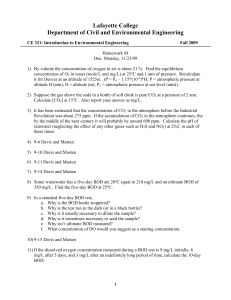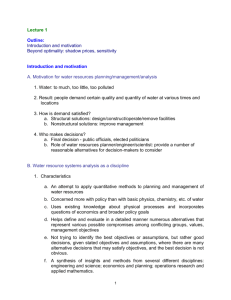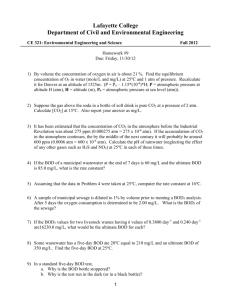letter to APA Board of Directors
advertisement
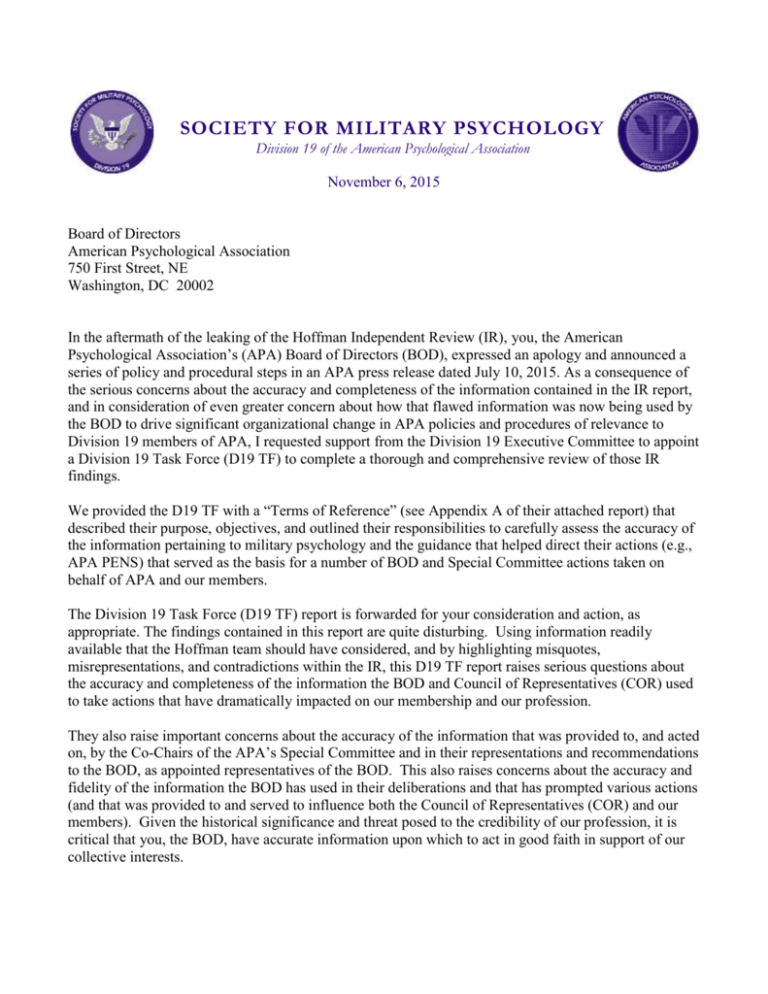
SOCIETY FOR MILITARY PSYCHOLOGY Division 19 of the American Psychological Association November 6, 2015 Board of Directors American Psychological Association 750 First Street, NE Washington, DC 20002 In the aftermath of the leaking of the Hoffman Independent Review (IR), you, the American Psychological Association’s (APA) Board of Directors (BOD), expressed an apology and announced a series of policy and procedural steps in an APA press release dated July 10, 2015. As a consequence of the serious concerns about the accuracy and completeness of the information contained in the IR report, and in consideration of even greater concern about how that flawed information was now being used by the BOD to drive significant organizational change in APA policies and procedures of relevance to Division 19 members of APA, I requested support from the Division 19 Executive Committee to appoint a Division 19 Task Force (D19 TF) to complete a thorough and comprehensive review of those IR findings. We provided the D19 TF with a “Terms of Reference” (see Appendix A of their attached report) that described their purpose, objectives, and outlined their responsibilities to carefully assess the accuracy of the information pertaining to military psychology and the guidance that helped direct their actions (e.g., APA PENS) that served as the basis for a number of BOD and Special Committee actions taken on behalf of APA and our members. The Division 19 Task Force (D19 TF) report is forwarded for your consideration and action, as appropriate. The findings contained in this report are quite disturbing. Using information readily available that the Hoffman team should have considered, and by highlighting misquotes, misrepresentations, and contradictions within the IR, this D19 TF report raises serious questions about the accuracy and completeness of the information the BOD and Council of Representatives (COR) used to take actions that have dramatically impacted on our membership and our profession. They also raise important concerns about the accuracy of the information that was provided to, and acted on, by the Co-Chairs of the APA’s Special Committee and in their representations and recommendations to the BOD, as appointed representatives of the BOD. This also raises concerns about the accuracy and fidelity of the information the BOD has used in their deliberations and that has prompted various actions (and that was provided to and served to influence both the Council of Representatives (COR) and our members). Given the historical significance and threat posed to the credibility of our profession, it is critical that you, the BOD, have accurate information upon which to act in good faith in support of our collective interests. Our Division 19 Executive Committee (EXCOM) has reviewed and fully endorses the D19 TF findings and recommendations detailed in pages 5-9 of the attached D19 TF report. We greatly appreciate the efforts of our D19 TF to highlight and identify these important findings in three months and with a budget of $5000. Our Division 19 leadership is committed to taking those actions recommended that are within our Division’s scope of responsibility and control. However, we have identified a number of recommendations that are within the scope of responsibility and control of the APA BOD which are briefly summarized below: 1. That the BOD ensures the APA Ethics Code focuses on behavior, not settings. 2. Given that Hoffman acknowledges in the IR that neither he nor members of his team understood the profession of psychology, in light of the inaccuracies and misrepresentations identified by the D19 TF report, appoint a knowledgeable, neutral third party to complete thorough review of the IR and report back to the BOD their findings. 3. That the BOD provide an explanation for actions that have had a deleterious impact on Division 19 members. To wit; a. The justification and basis the BOD relied on for not establishing processes to allow those Division 19 members most harmed by the alleged findings in the IR an opportunity to review it prior to its release. b. What considerations and legal analysis the BOD relied upon to determine the impact of displacing the U.S. government determinations of compliance with “international law” with the United Nations. c. The justification by BOD for recommendation to COR that they adopt the August 2015 resolution prohibiting psychologists’ involvement in interrogation in the absence of any credible claim or evidence that any DoD psychologist engaged in unethical interrogation related activity in the decade following APA’s adoption of the PENS report. d. The BOD deliberation and justification for support to August 2015 resolution prohibiting military psychologists from working in detention facilities unless they are working directly for the detainee or “for an independent third party” since however unintended, this precludes actions by military psychologists since they work “directly for” DoD but provide mental health care “on behalf” the detainee. e. The BOD justification to allow two non BOD members to have access to and to review the IR prior to its release, and for those individuals to dictate actions to the BOD members. f. The BOD justification to take actions and/or support calls for recusal of BOD members in the absence of any conflict of interest. g. The justification and process by which the BOD decided to allow information about an ethics complaint to get revealed to the public, in apparent violation of the APA Bylaws and Ethics Committees “Rules and Procedures.” h. The justification and basis for decision by members of the Special Committee, representing the BOD, to apologize to detainees and their families during the APA Town Hall (disregarding the negative allegations regarding military psychologists such an apology represented). i. What steps the BOD took, consistent with exercising their fiduciary responsibility to monitor the costs associated with the IR. j. What justification the BOD has for allowing the Hoffman team to recently “revise” portions of the IR after its release without alerting and affording membership of this action to allow those named in the report a commensurate opportunity to “correct” errors in light of the concerns this action creates an appearance of quietly cooperating with the Hoffman team to allow them to protect their legal interests (i.e., potential legal liability for inaccuracies or misrepresentations). k. What actions the BOD will take to correct the Hoffman IR to ensure it accurately addresses DoD policies related to interrogation; conveys accurate information about how interrogations are conducted and supported; reflects military cultural awareness; and is free from bias against military psychology and military psychologists. 4. That the BOD take steps, in the interest of accountability and transparency, to release all material referenced in the Hoffman IR. While the legal opinion to not do so may protect the BOD members from legal liability for their actions, as the owner of that “privilege” and as representatives of those members alleging harm that is now hidden by that privilege, is not the same “duty” to open up “all its electronic and hard copy files” that was provided to the Hoffman team the same “duty” now owed to those who now allege they were harmed by those findings? 5. That the BOD share the basis for its determination and assertion that military psychologists were “given insufficient guidance” regarding the conduct of interrogations in its 17 September 2015 response to Dr. Brian Baird. Many will read these recommendations and requests for information and question, why? They may want to “just move on” since this has been such a painful episode for professional psychology. However, leaders of organizations cannot just wish problems away. As our leaders, as those who serve as the “persons of trust” (i.e., fiduciaries) of our organization, we look to you to exercise your moral and legal obligation for your duty of care that demands you carefully analyze and act on the facts, not just react to the fervor evoked from misinformation, innuendos, and misrepresentations contained in the IR. The D19 TF findings offer you a more factually sound explanation and basis for many of the IR’s findings related to the PENS report and to military psychologists and their support to interrogations that have prompted APA BOD and COR policy actions (and concerns within our membership). In light of those actions already taken, and out of concern for those being considered, the attached report provides you with compelling evidence that the IR information used as the basis for the decision-making process and that served as the basis for those and others being considered, was flawed and incomplete. In addition, while many may be tempted to assert or argue that we all should be passive recipients of the information contained in the IR, that is not appropriate for our leadership. Taking that approach would deny the BOD the ability to exercise their responsibility to make decisions with the requisite care to act in good faith based on the facts (and not based on their personal interests out of fear for, and/or to avoid being attacked or accused of “collusion” if they raise any legitimate opposition to, or concerns about, the IR findings). Previous calls to address the real and legitimate concerns about the accuracy of the findings in the IR should have alerted you to the need for due diligence and appropriate, deliberative action to address those concerns. A number of these concerns were detailed in the July 29th 2015 letter to the two CoChairs of APA’s Special Committee and have never been addressed. The attached D19 TF report will no doubt create a dilemma: it persuasively reveals the flawed nature of much of the relevant information contained in the IR about the PENS report and related to psychologists’ support to interrogation, and the information that was used to act on by the BOD and COR. The dilemma is that while some members of APA may emphatically state, “it doesn’t matter,” since they are opposed to any support to interrogations, the BOD has a legal responsibility to take actions based on an informed basis, in good faith, and with the honest belief that their decisions and actions are based on facts, and not in response to inaccurate misinformation that is used to stir and evoke emotional recriminations about actions that did not happen. The D19 TF report reinforces “our core values” and the need to ensure that actions taken by our BOD and COR are based on accurate and complete information. As those in whom we place our trust to act in good faith to represent our interests, we encourage your action on these recommendations to help ensure our “way forward” is one that rests on a foundation of truth, honesty, and accuracy. Our Division leadership stands ready to assist the BOD in their next steps related to these D19 TF revelations. Thomas J. Williams Thomas J. Williams, Ph.D. President Division 19 Society for Military Psychology

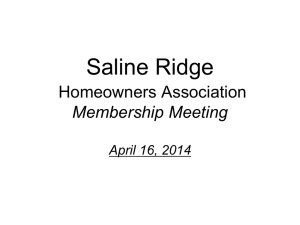
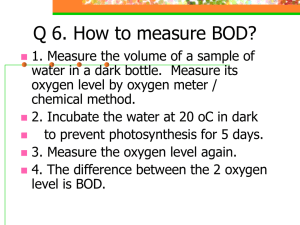
![Crisis Communication[1] - NorthSky Nonprofit Network](http://s2.studylib.net/store/data/005428035_1-f9c5506cadfb4c60d93c8edcbd9d55bf-300x300.png)
